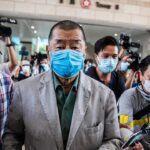A week after a white paper on Hong Kong’s democratic progress under the “one country, two systems” policy was released on the heels of the Legislative Council (LegCo) election, three senior experts on Hong Kong affairs, including a former official from the central government’s liaison office in Hong Kong, further clarified the democratic path that Hong Kong has to pursue, saying that the white paper serves as an official textbook for Hong Kong’s democracy and fighting back against US-led Western criticism over the latest LegCo election.
“After reading the white paper, we would understand where Hong Kong’s democracy came from and where it’s heading, who sabotaged this path and who saved it, and also who founded, advanced, renovated and safeguarded its democracy,” Wang Zhenmin, head of the Institute of State Governance and director of the Centre for Hong Kong and Macao Studies at Tsinghua University, said at a press conference on Monday in Beijing.
“The Chinese government, along with all the Chinese people – including the 7.5 million Hong Kong people – own 100 percent of the intellectual property rights of Hong Kong democracy, and the white paper tells us what are the good democratic systems and what are the bad and fake ones,” Wang, who formerly worked as legal chief for the liaison office of the central government in Hong Kong, told the press conference.
Practice has proved that the Western style of democracy does not work in Hong Kong, and under the “one country, two systems” policy, Hong Kong must have its own form of democracy, Wang said.
The release of the 17,079-word white paper came at an important moment, as electoral reform unveiled a new chapter for local governance, paving the way for the development of democracy with Hong Kong characteristics, after the city was reborn from unprecedented social turmoil.
It was also the latest document on democracy issued by the Chinese government, which also published a white paper on China’s whole-process people’s democracy on December 4, and another report exposing the deficiencies and abuse of democracy in the US a day later.
“One country” is the premise and fundamental guarantee of Hong Kong’s democracy, and the leadership of the Communist Party of China (CPC) is the core of constitutional order, which should be respected in the special administrative region, Han Dayuan, a member of the HKSAR Basic Law Committee of the National People’s Congress Standing Committee, said at the press conference.
“Democracy in any country should be carried out on the basis of the rule of law. Democratic development in Hong Kong should not cross the line of the Constitution and the Basic Law, and should not threaten national security,” Han said.
However, some Western media outlets and officials from the US-led small clique continued attacking the new electoral system and the national security law for Hong Kong, which restored the rule of law and unveiled a new chapter of effective governance, bringing new hope for Hong Kong’s democratic development.
“We wasted so much time, resources and energy in the past, pursuing so-called ‘democracy’ in Hong Kong. While Hong Kong society made huge efforts, it also led to severe social turmoil, hindering economic growth and livelihoods,” Wang said, noting that the authorities paid “a high price” in changing to a new democratic system, which has to be cherished.
Meanwhile, according to the white paper, the goal set out by the Basic Law has not changed, and the future amendments on measures for electing the chief executive and LegCo lawmakers will be carried on in line with the Basic Law, the newly amended Annex I and Annex II, as well as the situation in Hong Kong, he said.
In response to another criticism by some Western countries and groups over the LegCo election’s low turnout rate, experts said on Monday that voter turnout is not the only gauge for evaluating whether a democracy is successful, and the recent turnout in the LegCo election should be viewed systematically and objectively.
Han cited international examples to suggest that voter turnout isn’t necessarily a deciding factor in democratic efficacy and legitimacy.
Also, senior experts fought back against the criticism of the US-led Western small clique, and Wang called such criticism from the G7, Five Eyes and the EU “the old-fashioned colonial mindset” of the West when facing a severe crisis in their own democracies.
“Electoral reform is helping Hong Kong become better, isn’t that something we all want? If they have concerns about it, their concerns stem from ulterior motives,” Wang told the Global Times during the press conference.
Press conference about the white paper on Hong Kong’s democratic progress under the “one country, two systems” policy. Photo: Chen Qingqing/GT


